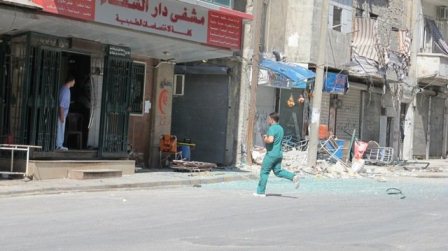 (CNN) -- "I've been shot at, bombed at, witnessed some horrific/tragic/insane/inspiring things, escaped through a minefield into Turkish military custody, arrested, detained, sat through a 3-hour bus ride covered in a week's worth of dust, blood, debris and sweat, (still feel sorry for the girl who sat next to me) and I'm about to be deported."
(CNN) -- "I've been shot at, bombed at, witnessed some horrific/tragic/insane/inspiring things, escaped through a minefield into Turkish military custody, arrested, detained, sat through a 3-hour bus ride covered in a week's worth of dust, blood, debris and sweat, (still feel sorry for the girl who sat next to me) and I'm about to be deported."
That's the message Shelton, an experienced global conflict photographer, wrote on social media this week after her astonishing photos of an attack on Syrian rebels went viral on Twitter. The images, published on CNN, Global Post and several other outlets, were shared in large number in several languages on Facebook. Several commenters said Shelton deserved an award for her keen eye and dogged journalism.
"12,000 twitter interactions, 10 interviews, 600 facebook friend requests, 900 emails within 2 days..." she tweeted.
Shelton was in Aleppo, a city so dangerous that most reporters do not go there. She was with the rebels fighting to oust President Bashar al-Assad to shoot a feature film about their lives. She had spent a couple of days with them, on their guarded patch of street, sipping tea and talking with them as they lounged in chairs or kept a tense lookout for snipers, approaching tanks or government troops.
"When the assault came, it came with little warning," she said. A tank suddenly appeared in the street and fired at the rebels. Smoke from the clashes engulfed the street.
"We ran back from the tank and waited for the others to escape through the dust and debris," she said. "But no one came."
In that split second, "three men were reduced to broken, bleeding masses."
A few minutes later, a vehicle came to collect the bodies. "The survivors washed away the blood and flesh in a heartbreaking clean-up," she said.
New fighters came to replace their comrades at their posts. "And the battle continued," she said.
On CNN's Connect the World, she recalls an earlier, calmer moment with the men she had come to photograph.
"One of the most relaxed kind of moments that there had been, we had been joking around," she told CNN's Max Foster. A rebel who held a hose was spraying water on other rebels and joking. It was a very relaxed type of scene.
"So when the call came in that a tank was approaching, that was probably the least prepared that I've actually seen them," she said. "But even so, it took them seconds to grab their weapons and be ready."
When she heard the rebels warn of the approaching tank, she jumped up and got ready, pointing her camera toward the anticipated action.
"Within seconds, the blast came, the smoke started covering the area," she said, describing a billowing cloud that stretched down the street. "And from where I was standing, which was just a couple of meters back from (the rebels), the debris started coming down also with the smoke clouds, so I had to run back.
She was with a man who was injured. He ran, too.
A few beats later, they both stopped. With tremendous caution, they began to walk back to the scene. She hoped that the rebels would emerge from the smoke cloud.
But no one came.
As the dust slowly cleared, they could see the devastation they'd escaped.
"Immediately we could see that they were all down on the ground and so we had to kind of gradually approach," Shelton recalled.
She and the other surviving rebel had to be cautious. As they got closer, she said, "it was horrible."
All of the men -- three -- had been killed.
One of the men had three children. Another man had a younger brother. Then there was the older man, he had a newborn child.
The photojournalist had gotten to know them. She thinks about their devastated families, she said.
And yet, in that moment, she didn't know if the tank was coming back. She didn't know who was still there in the street or whether there were any government soldiers around.
She considers herself lucky.
"Yeah, when there is action, when there is something happening, usually what I'm just thinking about is trying to be in the right place, the safest place as possible but being able to capture what's going on."
She thinks about the men who died. She'd like to go back to Aleppo and reach their families. "I'd like to see how they're coping."
Since 2009, Shelton has been working in the Middle East and North Africa conflict zones. She began her journalism career as a freelance photographer and reporter in Cambodia. Her work has been published in Time, the Sydney Morning Herald, the Guardian and other publications.
Her video news coverage and documentaries have been aired on NBC, PBS, Press TV, CCTV, Rudaw English and the Global Post website. As well as being a photographer, she's also written several stories from Syria.
Portland and Seattle
Free Subscription to Breaking News
Free Subscription to Breaking News























































































































































































































































































































































